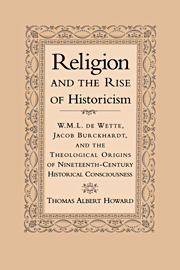 Religion and the Rise of Historicism
Religion and the Rise of Historicism Book contents
- Frontmatter
- Contents
- Acknowledgments
- Introduction: History, Theology, and Modernity
- 1 W. M. L. de Wette: Enlightenment, Romanticism, and Biblical Criticism
- 2 De Wette and Schleiermacher at Berlin (1810–1819): Politics, History, and the Post-Enlightment Transformation of Theology
- 3 De Wette, D. F. Strauss, and the New Christusbild
- 4 Basel, Burckhardt, and de Wette
- 5 History without Centaurs
- Abbreviations: Used in Notes and Bibliography
- Notes
- Bibliography
- Index
2 - De Wette and Schleiermacher at Berlin (1810–1819): Politics, History, and the Post-Enlightment Transformation of Theology
Published online by Cambridge University Press: 02 December 2009
- Frontmatter
- Contents
- Acknowledgments
- Introduction: History, Theology, and Modernity
- 1 W. M. L. de Wette: Enlightenment, Romanticism, and Biblical Criticism
- 2 De Wette and Schleiermacher at Berlin (1810–1819): Politics, History, and the Post-Enlightment Transformation of Theology
- 3 De Wette, D. F. Strauss, and the New Christusbild
- 4 Basel, Burckhardt, and de Wette
- 5 History without Centaurs
- Abbreviations: Used in Notes and Bibliography
- Notes
- Bibliography
- Index
Summary
If it is true that our religious culture (Bildung) rests on history, then our theology must certainly be historical.
– De Wette, Über Religion und TheologieThe nineteenth century began with a tabula rasa in relation to everything.
– Burckhardt, Letter to Gottfried Kinkel, 13 June 1842As maurice mandelbaum has noted, the conventional view that hostility prevailed between religion and science in the nineteenth century is often overstated. Although many intellectuals criticized traditional interpretations of Christian doctrines, the vast majority defended the legitimacy of religion in general and celebrated its emotional and aesthetic value. Quite often, attacks on Christian orthodoxy were carried out in the name not of science but of religion itself. Orthodox dogmas were not attacked for “the sake of undercutting religious faith” but rather as “a means of freeing that faith for … nobler and more adequate forms in which it could find expression.” In their efforts to “free up” religion, many intellectuals repeatedly raised an important question: what is the relationship of traditional Christian orthodoxy to this modern, nondoctrinal understanding of religion? Few theologians were willing to put Christianity on a plane with other world religions (as Ernst Troeltsch did later in the century); but defining Christian belief to guarantee its cultural supremacy, while simultaneously disavowing its orthodox formulation, required unprecedented theological maneuvering.
Because of the dominance of his legacy, Friedrich Schleiermacher is normally associated with the liberal reformulation of Christian belief in the early nineteenth century.
- Type
- Chapter
- Information
- Religion and the Rise of HistoricismW. M. L. de Wette, Jacob Burckhardt, and the Theological Origins of Nineteenth-Century Historical Consciousness, pp. 51 - 77Publisher: Cambridge University PressPrint publication year: 1999


